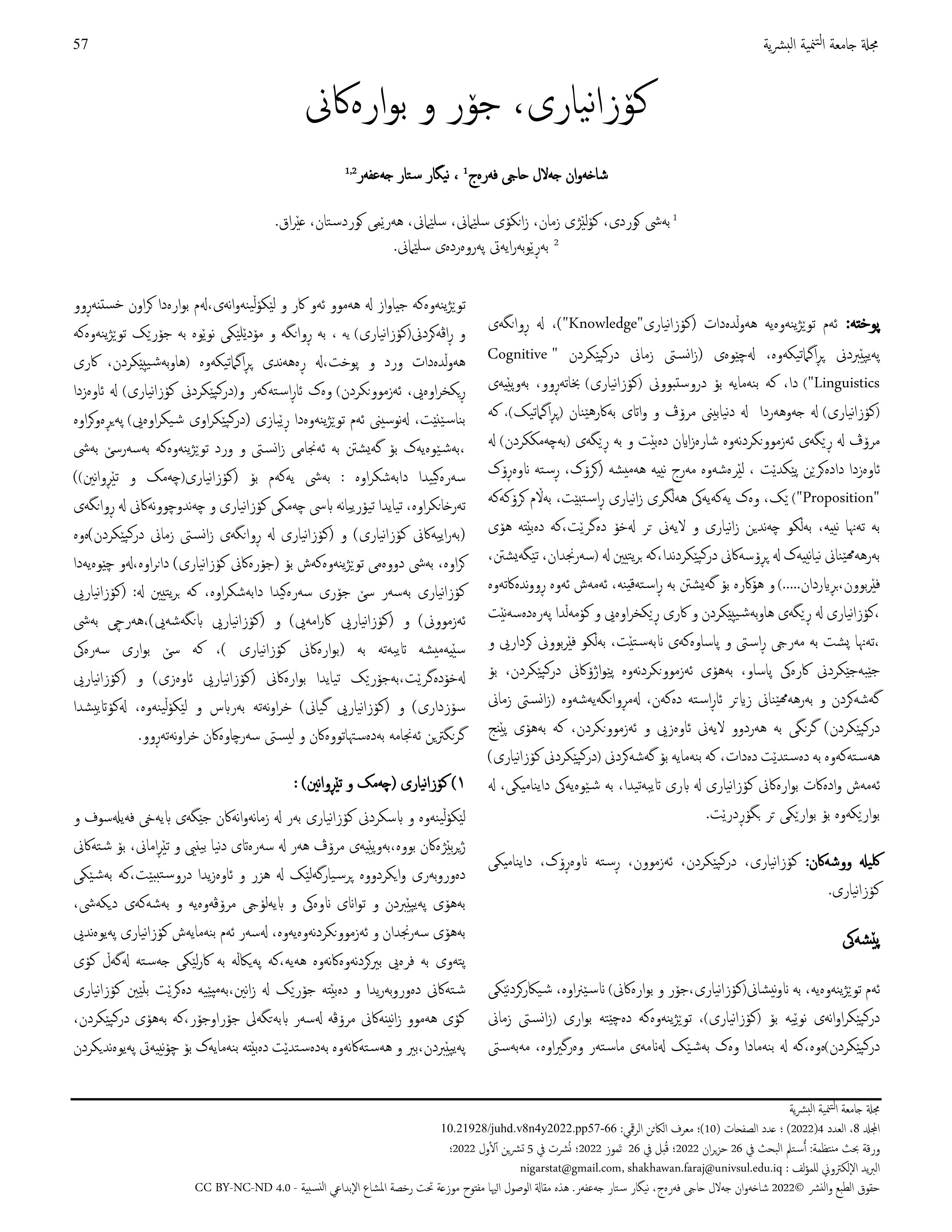Knowledge: Types and Fields
DOI:
https://doi.org/10.21928/juhd.v8n4y2022.pp57-66Keywords:
Knowledge, Cognitive, Experience, Proposition, Knowledge DynamicsAbstract
This research attempts to illustrate knowledge from the perspective of
Pragmatic Perception within the framework of Cognitive linguistics, which is
the basis for the formation of knowledge, in the core knowledge consist of
human worldview and meaning usage (Pragmatic), which human became
familiar with through experience, and they are formed in the mind through
conceptualizations. Here we can say it is not necessarily always proposition as a
unit carrying information be true, but the proposition is not alone, it includes
some information and other aspects, it will produce a lot of flexibility, in
cognition processes, which are (Attention, Understanding, Learning, Decision-
making, etc.) it will be reason to reach the truth, and this explains that
knowledge develops through sharing, organizational and community work, not
only depend on the truth condition of and its justification, but on practical
learning and executing justification, within experience which are directed
cognition processes to further development and production, on this is concern
with side (mentality, experience), basis Cognitive linguistics, which are
achieved by our five senses and essential to develop knowledge Cognitive, this
will change the fields of knowledge in specific situation dynamically from one
field to another.
References
سەچاوە کوردییەکان:
کتێب:
حسێن،شیلان(٢٠٢١). زانستی زمانی کارەکیی. چاپی یەکەم،چاپخانەی پیرەمێرد.
نامە:
ئیبراهیم،شیلان(٢٠١٩). نەخشاندنی کۆزانیاری وشەیی لە فەرهەنگی ئاوەزییدا.
نامەی دکتۆرا. کۆلێژی زمان. زانکۆی سلێمانی.
غەریب، نالی(٢٠١٦). درکپێکردنی میتۆنیمی لە زمانی کوردیدا. نامەی ماستەر. کۆلێژی زمان. زانکۆی سلێمانی.
گۆڤار:
قادر، کاروان(٢٠١٧). داڕشتەی چەمک لە زمانی کوردیدا. گۆڤاری زانکۆی ڕاپەڕین. بەشی(٤). ژمارە(١٣).
سەچاوە ئینگلیزییەکان:
کتێب:
Dombrowski, E. , Rotenberg, L . And Bick, M (2013).Theory of Knowledge . Oxford University Press.
Descartes , R (1997) . Key philosophical writings. Wordsworth Editions Ltd. Hertforddshire.
Gardner, H (2006). Changing minds: The art and science of changing our own and other people’s mindss. Harvard Business School Press. Boston.
Kotter, J., P. And Cohen,D., S (2002).The heart of change: Real-life stories of how people change their organizations. Harvard Business School Press. Boston.
Kahneman, D (2011).Thinking Fast and Slow. Farrar ,Staus and Giroux. New York.
Klein, G (2003). The Power Of Intuition: How to Use Your Feelings to Make Better Decisions at Work. Currency/Doubleday. London.
Marshall, I . And Zohar, D (2004) . Spiritual capital. Wealth we can live by. Berret Koehler. San Francisco.
Maxwell, N (2007). From knowledge to wisdom: A revolution for science and humanities. 2nd edition. Prentice Hall. London.
Nonaka, I . And Takeuchi, H (1995). The Knowledge-Creating Company. New York Oxford. Oxford University Press.
Neta, R. And Pritchard, D (2009). Arguing about knowledge. Routledge. London.
Polanyi, M (2009). The Tacit Dimension. foreword by Sen , Amartya. The University of Chicago Press. Chicago and London.
Pritchard, D (2014). What is this thing called Knowledge. Third edition. Routledge. Now York.
Winterton, J. And Stringfellow, L (2006). Typology of knowledge, skills and competences: clarification of the concept and prototype. Luxembourg: Office for Official Publications of the European Communities.
Russell, B (1945). A History of Western Philosophy. Simon and Schuster. New York.
Russell, B (2009). Human Knowledge : Its Scope and Limits Routledge . With an introduction .by John G.,S . London and New York.
Tsoukas, H . And Mylonopoulos, N (2004). Organization as Knowledge Systems.: knowledge, learning and Dynamic Capabilities. Palgrave Macmillan.
گۆڤار:
Bratianu, C (2013). The Triple Helix of the Organizational Knowledge. Management Dynamics in the Knowledge Economy. Vol(1). Issue(2). Pages (207-220).
Gettier, E (1963). Is Justified True Belief Knowledge?. Oxford Acadimic /Analysis. Vol (23). Issue( 6) .Pages (121–123).
Lehrer, K (1965). Knowledge, Truth and Evidence . Oxford Acadimic/ Analysis. Vol( 25). Issue (5).Pages (168–175).
Bejinaru, R . And Bratianu, C (2019). The Theory of Knowledge Fields: A Thermodynamics Approach. Researchgate.net.

Downloads
Published
How to Cite
Issue
Section
License
Copyright (c) 2022 Shakhawan Jalal Faraj, Nigar Star Jafar

This work is licensed under a Creative Commons Attribution-NonCommercial-NoDerivatives 4.0 International License.


